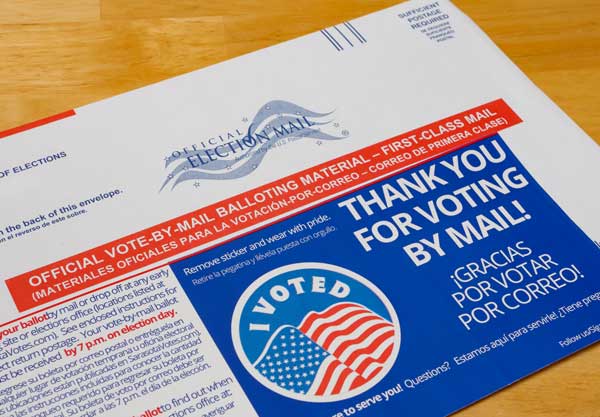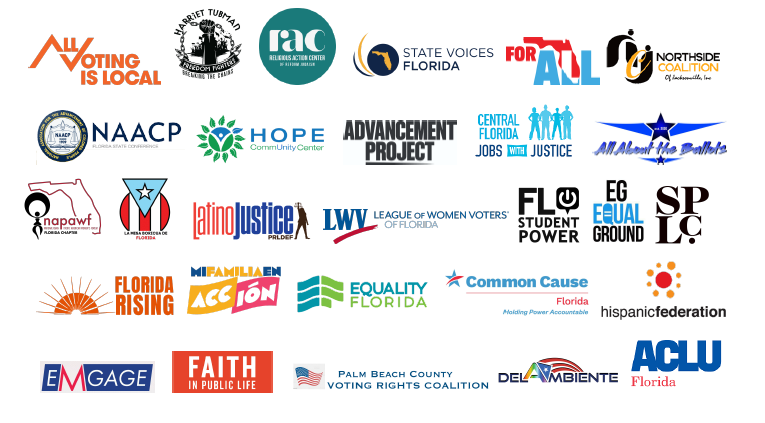Voting Rights Organizations’ Letter to Elected Officials Regarding systems that guarantee safety of FL elections


June 25, 2024
Dear elected official,
While dis- and misinformation about our elections have circulated for many years, the 2020 election acted as the impetus for sowing doubt regarding the safety and security of our voting systems, particularly in relation to falsehoods perpetuated around the safety and reliability of vote-by-mail ballots. All election disinformation is dangerous; according to POLITICO, “disinformation alone has now become the single biggest threat to electoral integrity in many countries around the world, meaning that what election authorities have traditionally seen as their biggest obligation — organizing technically competent free and fair elections — is no longer enough.”1
Our organizations want to stress the critical role you play in combating dis- and misinformation. Your role requires you to avoid the amplification of false claims and share accurate and reliable information from trusted sources such as the Supervisor of Elections Office about the election process through all available means.
We want to reaffirm that there are systems in place that guarantee the safety and accuracy of our elections. These include:
- List Maintenance
Florida law requires that Supervisors of Elections conduct a general registration list
maintenance program.2 This protects the security of the electoral process by maintaining
accurate and current voter registration records in the statewide voter registration system.
It’s particularly important to underscore that unless the voter requests it in written form,
the voter moves out of the state or passes away, or the voter is determined to be
ineligible, their name may not be removed from the statewide voter registration system
any later than 90 days before the date of a federal election. For the August 20th Primary
Election, the 90-day deadline was May 22, 2024. - Logic and Accuracy Testing
In Florida, any voting system that will be used in an election is tested and approved by the Secretary of State’s office before the system can be purchased and used by the county Supervisors of Elections.3
To ensure that voting equipment is working properly after being programmed, Florida law requires that the Supervisor of Elections office conduct public testing of a sample automatic tabulation equipment, including all programmed precinct devices, ballot marking devices, and tabulators that will be used for vote-by-mail ballots and central counting, as well as any independent auditing scanners.4
As stated above, this process is done publicly, with public notice of the testing given at least 48 hours before, and it must happen within 25 days before early voting is scheduled to begin in the county. During this public testing, the county canvassing board convenes to certify the accuracy of the test. If any tabulating device is deemed unsatisfactory, it must be recoded, repaired or replaced, and retested. The canvassing board or its representative must determine the device to be satisfactory before it may be used in any election.
Public participation is encouraged and anyone wishing to understand more about how voting equipment works is welcome to attend these proceedings and should verify with the county Supervisor of Elections office when these are held. - Paper Ballots
Florida elections are conducted using paper ballots.5 To designate ballot selections, all voting must be by mark-sense ballot, using a marking device or a voter interface device that produces a voter-verifiable paper output and meets the voter accessibility requirements for individuals with disabilities under s. 301 of the federal Help America Vote Act of 2002 and Fla. Stat. § 101.56062. - Reporting of Vote-By-Mail Count
Florida law requires Supervisors of Elections to post on their website the number of vote-by-mail ballots received and how many remain uncounted.6 This must begin at 7:00 p.m. on election day and continue at least once every hour while actively counting. - Recounts
Florida law provides for when a machine recount and a manual recount must be ordered,7 and who orders them. The Secretary of State orders any recount (machine or manual) for federal, state, or multicounty races involving candidates for office, candidates for judicial retention, and measures appearing on the ballot. For all other races, the County Canvassing Board orders the recount.
Machine recounts must be ordered if the first set of unofficial returns indicates that a candidate was defeated or eliminated by half of one percent or less of the total votes cast for an office. They must also be ordered if an issue appearing on the ballot was approved or rejected by half of one percent or less of the total votes cast on the issue. Any candidates who are defeated or eliminated from contention for the office by half of one percent or fewer are able to request in writing that a machine recount not be conducted – if this is the case, then a machine recount is not needed.
Manual recounts must be ordered if the second set of unofficial returns indicates that a candidate was defeated or eliminated by a quarter of one percent or less of the votes cast for such office. They must also be ordered if a measure appearing on the ballot was approved or rejected by a quarter of one percent or less of the votes cast for such measure. If the defeated candidate requests in writing that a recount not be made, or if the number of overvotes and undervotes is fewer than the number of votes needed to change the outcome of the election, then a manual recount is not needed. - Certification
A certification process follows every election in Florida to ensure that votes are accurately counted and to confirm the results. At the county level, the County Canvassing Board, which is composed of the County Supervisor of Elections, a County Commissioner, and a County Judge, certifies the results. After the county certifies, the state Election Canvassing Commission, which consists of the governor and two state cabinet members which they select, must also confirm the count through the certification of election results.8 - Audits
Florida law already requires that the county canvassing board conduct a manual audit or
an automated, independent audit of the voting systems used in randomly selected
precincts upon certification of an election.9 - Hand Counts
We are seeing a nationwide push for counties and municipalities to adopt policies and procedures to mandate full hand counts of ballots instead of, or in addition to, machine tabulation to occur before results are certified. This, however, is not legal in Florida. All counties must use an electronic or electromechanical precinct-count tabulation voting system.10
Florida law already establishes the highly controlled circumstances under which hand counts can be used to verify certain election results.11 It’s worth noting that hand counting is more error-prone and costly than counting by machine. It’s also much slower and delays delivering election results. - Mass Challenges
You may receive lists from private entities or individuals naming potentially ineligible voters and asking you to persuade election officials to remove them from the voter rolls.
First, it’s important to understand that Florida law prohibits the use of non-governmental entities to conduct list maintenance.12 These types of lists aim to circumvent Florida laws governing the voter challenge process, and forwarding these requests to election officials validates these individuals’ actions. Florida law only permits challenges during a 30-day window before and on election day, and they must come from a registered voter or poll watcher from the same county as the voter who is being challenged. Challenges must be delivered to the supervisor of elections or to the clerk or inspector at a polling place not emailed en masse to other officials.13
We hope that the clarifying information above will aid you in addressing any concerns expressed to you about the safety of our elections. Our nonpartisan coalition looks forward to opportunities to collaborate in ensuring that Florida’s elections are safe, secure, and reliable.
Sincerely,
| Brad Ashwell Florida State Director All Voting is Local Action | Rosemary McCoy CEO Harriet Tubman Freedom Fighters | Michele Eiger State Organizer RAC-FL |
| Juanica Fernandes Executive Director State Voices Florida | Angie Nixon Executive Director Florida for All | Kelly Frazier President Northside Coalition of Jacksonville |
| Adora Obi Nweze President NAACP Florida State Conference | Felipe Sousa-Lazaballet Executive Director Hope CommUnity Center | John Powers Progam Director Advancement Project |
| Chris Furnio and Jonahan Alingu Co-Executive Directors Central FL Jobs with Justice | Cassandra Brown JD, MPH Cofounder, Executive Director All About the Ballots | May Thatch Florida Senior Organizing Manager National Asian Pacific American Women’s Forum (NAPAWF) |
| Maruxa Cardenas Co-Director La Mesa Boricua de Florida | Isabelle C. Muhlbauer Advocate Manager for Voting Rights-National Latino Justice PRLDEF | Cecile M. Scoon, Esq. Co-President League of Women Voters of Florida |
| Debbie Chandler, Esq. Co-President League of Women Voters of Florida | Laura E. Muñoz Civic Engagement Director Florida Student Power | Genesis Robinson Interim Executive Director Equal Ground Education Fund |
| Jonathan Scott Weber Policy Director-Florida Southern Poverty Law Center | Moné Holder Chief Political & Advocacy Director Florida Rising Together | Soraya Marquez FL State Director Mi Familia en Accion |
| Jon Harris Maurer Public Policy Director Equality Florida | Amy Keith Executive Director Common Cause Florida | Laudi Campo Hispanic Federation Florida State Director |
| Corey Shearer Outreach Specialist Engage Florida | OdJuan Whitfield Organizing Manager Faith in Public Life | Sandy Kaltman Kate Renchin Mark Schneider Co-Chairs Palm Beach County Voting Rights Coalition |
| Osvaldo Fonseca Community Engagement Manager Del Ambiente | Bacardi Jackson Executive Director ACLU of Florida |
2Fla. Stat. § 98.065 – Registration list maintenance programs
3 Florida Department of State: About Voting Systems.
4Fla. Stat. § 101.5612 – Testing of tabulating equipment
5Fla. Stat. § 101.56075 – Voting methods
6Fla. Stat. §102.072 – Vote-by-mail count reporting
7Recount Procedure Summary: DE Reference Guidelines 0010 (Updated 12/2023)
8Fla. Stat. §102.111 – Elections Canvassing Commission
9Fla. Stat. § 101.591 – Voting system audit
10Fla. Stat. § 101.5604 – Adoption of system; procurement of equipment; commercial tabulations
11Fla. Stat. § 102.166 – Manual recounts of overvotes and undervotes
12Fla.Stat. § 98.075 – Registration records maintenance activities; ineligibility determinations
13Fla. Stat. § 101.111(1) – Voter challenges
